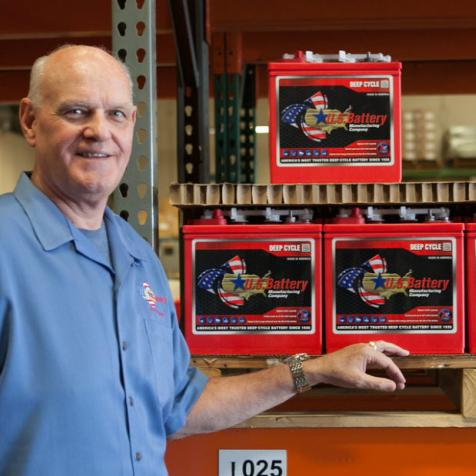
U.S. Battery Manufacturing Co.
By Dan Sanchez | Jul 23, 2017
Company Details
Location
Corona, California
Founded
1926
Ownership Type
Private
Employees
130
Products
Batteries
Corona, California
Founded: 1926
Privately owned
Employees: 130
Industry: Energy & Enviro
Products: Batteries
CMO Don Wallace takes pride in his company's manufacturing prowess while promoting the benefits of lead-acid battery technology.
The sheer volume of batteries manufactured at U.S. Battery in Corona, California, underscores the staggering number of vehicles and equipment powered by deep-cycle flooded lead-acid batteries. Golf carts, forklifts, portable cranes, floor-cleaning machines, and scissor/access lifts are just a few of the vehicles powered by the company's products.
Since its inception in 1926, U.S. Battery has grown to include two additional manufacturing plants in Georgia to supply a worldwide market that depends on these types of batteries to keep their businesses moving.

Founder John Anderson felt he could create a better battery, and envisioned the longstanding need for these batteries after a long career in the industry working with such companies such as Trojan Battery and Alco Battery.
The company is still family-owned. President and CEO Terry Agrelius, Anderson's son-in-law, is based in Georgia. The sales and marketing program is the responsibility of CMO Don Wallace, who carries on the tradition of ensuring that the quality of the product remains extremely high. While most large manufacturers have automated quality assurance, Wallace maintains that a human workforce is actually more efficient in this industry.

The Corona plant alone has a large workforce of 130 employees, many of whom have been with the company for 15 or more years. "We are able to control the quality of our products at a much higher level when you actually have hands on the product the entire way through the production process," says Wallace. "While automation can speed things up, you are often forced to cut corners. Additionally, if tolerances start to slide during the process, you will have built larger quantities of product that can have quality issues. We prefer to use our experienced employees to give our customers that level of personal attention and satisfaction in knowing that they are getting the very best products possible."
Challenges: Another one of Wallace's duties is to continuously educate the industry to the benefits of flooded lead-acid batteries. This has come under scrutiny with the onslaught of lithium batteries onto the market. "There are many opportunities to offer advanced lead acid batteries which will allow our industry to compete on a more head-to-head basis with lithium," says Wallace. "The hype on lithium focuses on only some advantages, but the industries we service also know that there are as many disadvantages too. One of the most important is that lithium is not recyclable, and when you evaluate the fossil-fuel requirements to charge larger lithium packs it often times leaves a larger carbon footprint than our current technology."

Wallace points out that all of the deep-cycle flooded lead-acid batteries the company manufacturers are 99 percent recycled. All of the components from the lead, to the plastic case, and even the electrolyte are recycled. Unlike aluminum, plastic and other highly recycled products, only flooded lead-acid batteries maintain a completely closed loop lifespan of the product. Currently, flooded lead-acid batteries are the most recycled products in the world.
Opportunities: More exports and OE business. "We have invested a considerable amount of sales and marketing efforts building up our international business," says Wallace. "We are now at a point where about 40 percent of our sales are at the international level. We have also placed a stronger emphasis on the original equipment market. In the past, much of our business was restricted to the aftermarket. We now supply some of the largest companies in the world in several of our target markets."
Needs: Growth within the U.S. and global markets have put a strain on the company's manufacturing capabilities. "We have been a principal supplier of premium deep-cycle batteries since 1926," says Wallace. "Over the ensuing years, we have focused on the global brand recognition. Those efforts have proven to be extremely successful, allowing to work through several plant expansions. We are at a point in time where we need to move into additional expansion programs to keep up with the demand."

